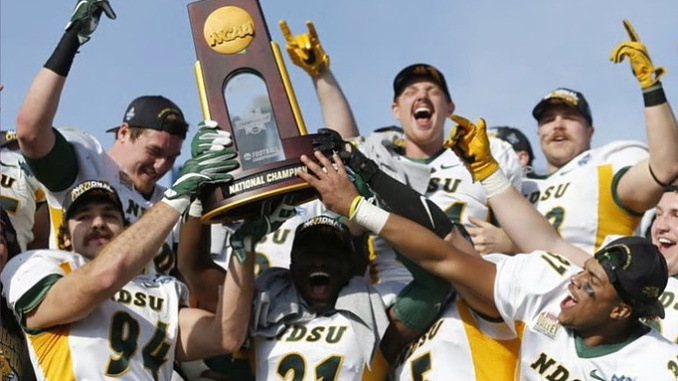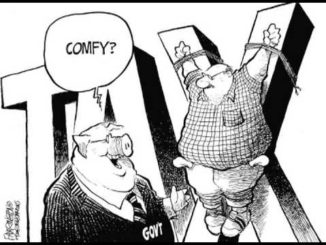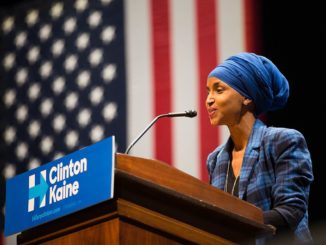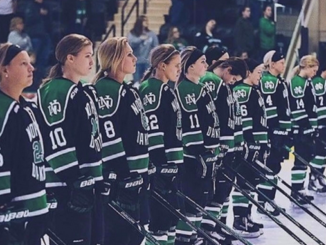
Last Saturday the North Dakota State Bison football team won its sixth FCS Championship in seven years . Congratulations to a program that is now often referred to as a “dynasty”. Yet, even amidst their success, there is reason to wonder whether North Dakota’s college sports should continue to exist at all?
Last April, I wrote about the University of North Dakota dropping their women’s hockey and swimming programs due to a directive to cut $1.3 million from the athletic budget. Dropping women’s hockey especially ruffled some feathers– despite the fact their program had lost $2 million in 2016. An article today in the New York Times shows some folks are still upset about the loss of the program.
Also last April, the Bismarck Tribune covered the budget deficits ran by athletic programs at NDSU and UND . The amount of dollars in the red ends up being pretty significant.
Neither of North Dakota’s major universities would come anywhere close on a balance sheet without being subsidized. R ecent financial reports from the NCAA also prove this.
When Minot State University announced last May that it would be cutting spending by 18 percent, due to state budget cuts, guess who survived? That’s right… athletics. According to a KX News report at the time, “Athletic programs are safe for now…but other areas are not.”
After attending a recent Minot State Men’s Basketball game, one person reported to The Minuteman that the attendance was around a 100 or less. To put this into perspective, the MSU Dome was built in 1981 with a capacity of 10,000 .
A research project reported on in January 2013 by the American Institutes for Research titled, “Academic Spending Versus Athletic Spending: Who Wins?”, was very telling. In considering the topic they said this:
“College athletics certainly provide nonfinancial benefits that are important to institutions, such as campus spirit, name recognition, and reputation. But other campus benefits appear modest, with boosts in applications, enrollments, or fundraising often a short-lived bonus resulting from a championship season. Despite large budgets, those in the top echelon of spending in the FBS may indeed impart less of a financial burden on their own institutions, but the vast majority of Division I colleges and universities rely heavily on institutional support as they try to keep up . Everyone likes a winning team, but what is the cost?” (Emphasis Added)
In considering whether athletics are self-supporting, they found this:
” It is apparent that most athletic departments depend on subsidies from universities and student fees to fund their programs. Even among the largest FBS programs, student fees and institutional subsidies typically provided between 4 percent and 14 percent of total athletic revenues… And without access to lucrative television contracts and large stadiums with sizable ticket sales revenue, the budgets at smaller FCS and DI-NF programs are heavily subsidized, although FCS programs are more likely to rely on institutional support , while DI-NF schools rely on student fees to fund much of their budget.” (Emphasis Added)
And their conclusion:
” The belief that college sports are a financial boon to colleges and universities is generally misguided. Although some big-time college sports athletic departments are self-supporting—and some specific sports may be profitable enough to help support other campus sports programs— more often than not, the colleges and universities are subsidizing athletics, not the other way around .” (Emphasis Added)
Given the fact that programs like these seem to have costs that outweigh the benefits, should they continue to be subsidized at all? I say no.
I realize such a position is not popular. Especially during a time in North Dakota where NDSU Football and UND Men’s Hockey are enjoying huge national success. Not to mention the fact that NDSU Alum and Philadelphia Eagles star Quarterback Carson Wentz has gained national attention and was recently named Fox Sports MVP in their end of the year awards.
But despite these successes, I just don’t find it as justification to continue subsidizing collegiate sports across North Dakota. As I said last April:
“I love sports. I have since I was a boy. But a little age has thankfully given me the ability to think a bit more rationally instead of emotionally. And rationale tells me that if these programs cannot sustain themselves, then they shouldn’t exist… none of them.
I understand people’s passion for athletics, but if someone has to give it shouldn’t have to be taxpayers.
Sources:
1. https://www.sbnation.com/college-football/2018/1/6/16827652/james-madison-ndsu-final-score-results-fcs-championship-2018
2. https://theminutemanblog.com/single-post/2017/04/10/Theres-a-Larger-Issue-at-Stake-than-UND-Womens-Hockey
3. https://www.nytimes.com/2018/01/10/sports/hockey/north-dakota-division-i-womens-hockey.html
4. http://bismarcktribune.com/news/state-and-regional/all-individual-sports-at-ndsu-und-lose-money/article_a9ea7b3f-6826-5348-8cb5-d0eadb369df0.html
5. http://sports.usatoday.com/ncaa/finances
6. http://www.myndnow.com/news/minot-news/minot-state-university-faces-budget-cuts/710472601
7. http://www.msubeavers.com/sports/2013/4/9/GEN_0409131627.aspx?id=207
8. https://247sports.com/nfl/philadelphia-eagles/Bolt/Fox-Sports-names-Carson-Wentz-MVP-113296995





